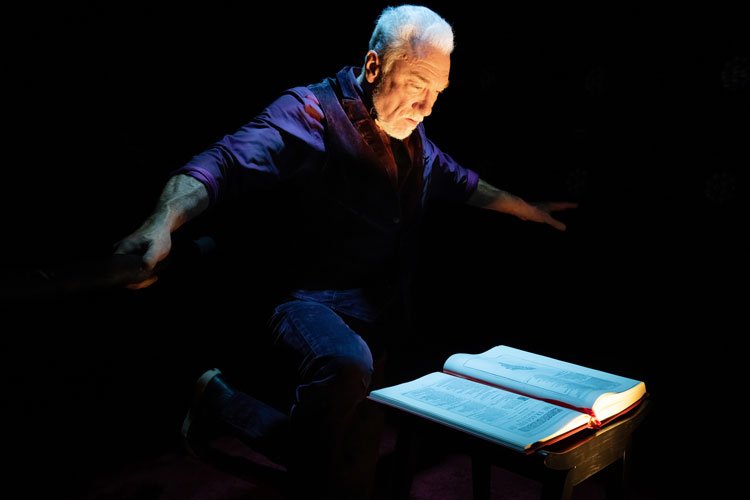Let’s face it: the women of Shakespeare’s Macbeth are ill-served by the script. The witches are largely stereotypes, there to move the plot along and provide some spookiness amid all the murder; Lady MacDuff appears in only one scene, by the end of which she’s dead; and while she is as commanding a presence as her titular husband at the start of the play, Lady Macbeth’s impact on the action quickly diminishes to nothing, ultimately resulting in an off-stage suicide. Over the years, there have been many attempts to delve deeper into the characters of the women of Macbeth (and their real historical counterparts) or to rewrite their roles and histories. One such successful recent attempt is Zinnie Harris’ Macbeth (an undoing), produced first by the Royal Lyceum Edinburgh and then brought to the states at Polonsky Shakespeare Center’s Theatre for a New Audience in Brooklyn, New York, where I saw it in its limited run in April 2024.
Harris puts the women at the center of the action, restructures their relationships to each other (Ladies Macbeth and MacDuff are cousins, raised together; Lady Macbeth and the Witches (here called Carlin, Mae, and Missy) have a history) as well as to the men (the marriage of MacDuff and Lady MacDuff is far from harmonious here), reorganizes the famous speeches to bring out different depths.
And damn, is it powerful stuff. (I’m not going to pretend the power of the piece is why I’m posting this review five months after I saw the show, which would be a lie. It’s pure procrastination. But here we are.)
As much as I love Shakespeare’s play, it has long bothered me (as it has so many other people; I am hardly the first to point this out) how diminished Lady Macbeth’s role becomes, and how sharply her character changes midway through the play. At the start, she is the strong one, holding to their shared purpose, pushing Macbeth to do what must be done to secure the prophecy the witches gave him, while he is the one who is indecisive, who hallucinates both visually (the dagger) and aurally (the voices crying “Macbeth doth murder sleep…”). Then that all changes, with Lady Macbeth going insane between scenes, reappearing as guilt-wracked sleepwalker, then dying off-stage while Macbeth stays “strong” (for some value of the word) against his rebellious thanes. Harris turns this on its head, in a fantastic sequence of scenes that serve both characters better, in my humble opinion. These are scenes that Shakespeare probably couldn’t have written in his time, but they work now.
Of course, they work so well because they are in conversation with Shakespeare’s work rather than trying to replace it. Throughout the script, several characters break the fourth wall (most notably Carlin, the eldest “witch,” at the start of the play and at the start of the second act, but also Lady Macbeth and others) acknowledging not only that they know they’re in a play but also that they have veered from the script to look at the story from a different angle. That new angle allows Harris to discuss misogyny, gaslighting, and the threat men seem to think strong women pose (in a particularly telling moment, the Thanes begin to address Lady Macbeth as “King,” and claiming it is his Lady who is slowly going insane … because they just can’t deal with the idea that a woman might be running the country not just capably but more capably than the man they elected; remembering those scenes now, in late August 2024, they definitely resonate stronger).
The production is set in a kind of nebulous 1930s, with costumes and furniture clueing the audience in. The staging made incredible use of moving mirrored walls, which indicate not just the walls closing in on the Macbeths but also how everyone’s actions reflect upon themselves and others. As you may be able to tell, I’m trying not to spoil too much of Harris’ changes; there are some moments that need to be seen in their fully staged glory to be as thought-provoking as they should be.
I do have to credit the cast. Nicole Cooper as Lady Macbeth, Emmanuella Cole as Lady MacDuff and Mae (the middle witch), Adam Best as Macbeth, James Robinson as Banquo, and Liz Kettle as Carlin led a great ensemble. This is not to denigrate the rest of the cast. These characters are on stage the most and command most of the attention. Kettle’s Carlin (who at the top of the show is giving a tweak on the lines Shakespeare gave the Porter, who is otherwise missing) was particularly captivating.
If you get to see a performance of this script, don’t hesitate! It’s an intense night of theater, but well worth the intensity to see a familiar story from an angle that plays off the original’s timelessness while still pointing a lens at our modern world.
I was unfamiliar with Zinnie Harris’ work before this, but I will be seeking out performances of not only her reconstructions/reinventions of other classic plays but her totally original work as well.
It is no secret that my favorite Shakespeare play is Macbeth. I’ve lost count of how many live productions of it I’ve seen, plus movie and TV versions I own in various formats, not to mention all the novels, graphic novels, and non-fiction books. Macbeth Monday is intended to be an occasional feature on the blog where I discuss whatever version or aspect of the story catches my attention at a particular moment.







